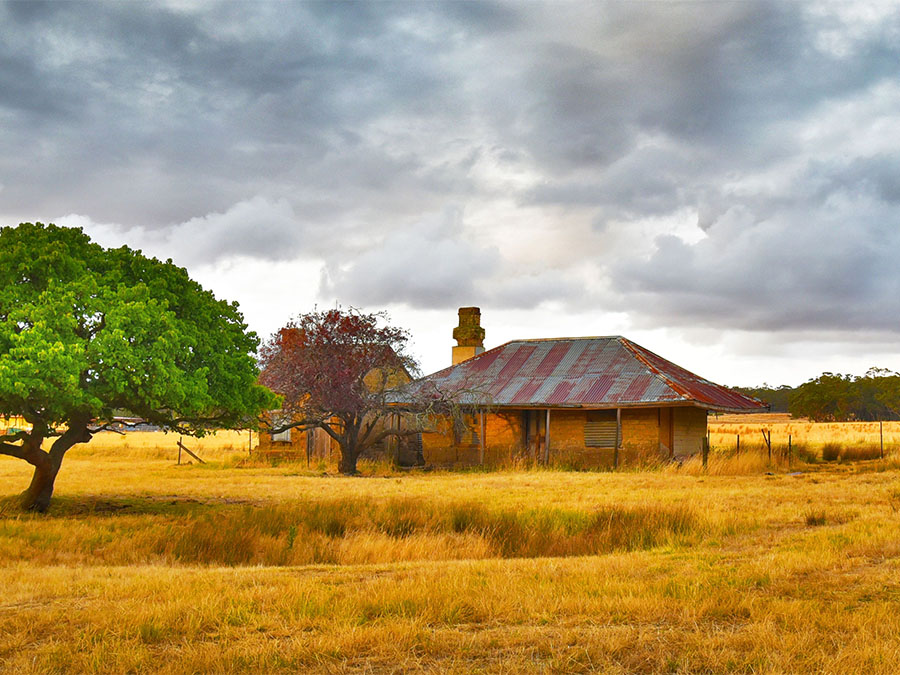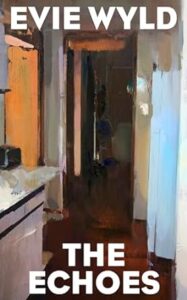My review of a beautifully dark and thought-provoking new piece of literary fiction by Evie Wyld, set between a remote Australian outback village haunted by terrible memories and a London flat inhabited by a disgruntled ghost.
I read and very much enjoyed Evie Wyld’s first two novels, After the Fire, A Still Small Voice and All the Birds, Singing. Wyld is a British/Australian literary fiction writer who grew up in both countries and now lives in London, and her writing tends to meld the contrasting worlds of urban Britain and outback Australia in interesting ways. Her latest novel, The Echoes, is no exception. We start in London with the voice of Max, a ghost who’s not very happy about his predicament:
“I do not believe in ghosts, which, since my death, has become something of a problem.”
We then go back to before Max’s death to see him living with his Australian girlfriend Hannah, and then we delve deeper into the past to Hannah’s childhood in The Echoes, a desolate part of the Australian outback that’s haunted by echoes of the Aboriginal people who were displaced from the land and of the notorious local school in which hundreds of Aboriginal children, having been forcibly separated from their parents, were forcibly detained and fed mathematics by white teachers who seemed genuinely to believe they were doing something good, even as the children persisted in running away or killing themselves in despair.
Amid the misery of Hannah’s childhood, she holds onto an old black and white photograph of a child, her grandmother, standing in front of an old house in London. The photograph, for her, represents a time of hope, before the family moved to Australia, before things started to go wrong. If she could just get back to that place, she reasons, it will be possible to mend everything that was broken.
The echoes of the title, then, are multi-faceted. It’s the name of the place where Hannah grew up, but there are also echoes of past events (mostly past trauma) rippling through the lives of everyone in the book. The powerlessness of Max, the ghost floating around in the London flat, observing Hannah first grieving and then slowly moving on to a new life without him, is not too different from many of the other characters. Unlike him, they can actually influence the world around them and try to break free of the echoes of the past, but many of them struggle to do so. Hannah is able to find her way to live in the same region of London as her ancestors left from, and she even visits the house from the photograph, but it provides no answers. She still secretly self-harms, still seems stuck in her life, still struggles to escape from the echoes of the past.
Wyld handles the multiple, inter-generational timelines effectively. They are all interspersed in chapters that follow the same pattern throughout the book: we start with “After” in the voice of Max the ghost, and then we go to “Before” to witness the recent past with Hannah and Max, told from Hannah’s point of view, and then we go back to “Then” to witness the more distant past in The Echoes in Australia, told in limited third person from Hannah’s point of view. There are also separate chapters named after other characters in the outback story, in which the third-person narration switches to their perspective to reveal things that are often very different.
It might sound difficult to follow, but it isn’t. The pattern of After/Before/Then, After/Before/Then starts to feel quite familiar and even appropriate, like the echoes of the title bouncing around from past to present and back again. And, for me, each strand worked well on its own. It’s worth mentioning, however, that when I referred to this book in my May reading roundup, Bill from The Australian Legend blog said he wasn’t impressed by Evie Wyld’s knowledge of the Australian outback—not in this particular book but in her previous writing. I mention that because I’ve found the UK settings in Wyld’s writing very authentic and true, and I wanted to include a different perspective from someone who lives and works in the rural Australian settings that Wyld also covers in her work.
The Echoes might also sound like quite a dark book, and that part is true. Evie Wyld’s writing tends to be, from what I’ve seen. She grapples with the effects of trauma, so it’s kind of inescapable. It’s not all bleak, though: there is some hope in the book, and not everyone is trapped forever in the echoes of the past. But it does pose the question of how we escape from the clutches of the past when we’ve gone so far down the wrong road. Wyld weaves the personal and political together, posing the same question for the characters and for societies.
Uncle Tone often alludes to both at the same time in his drunken outbursts to a young Hannah. After an awkward attempt to acknowledge the Wongi people on whose land they now live, he then adds:
“I’m not sure if they’d have taken that deal, when we first arrived off the boats. ‘Yeah, mate, don’t worry about it. We’re here now. We’re going to take the land and murder your kids. And murder the memory that you even fucking existed. Take your language away. But it’s OK, because in about two hundredodd years a bunch of cunts in an art gallery will acknowledge you. And they’ll all feel a bit better. Deal?’”
He then refers to the schoolhouse where he now lives, putting down roots amid the bones of all the dead children in the dust.
“But even if we moved. This whole fucking place. There’s bones all over the whole fucking place. My roots shouldn’t be growing over those bones.”
Realising he’s freaked out Hannah and her sister, he goes silent and then tries to lighten the mood by shouting “Boo!” and making them jump. Then he says:
“I dunno… sorry, girls. There’s no unfucking it, is there? Once you’ve fucked it up there’s no unfucking it.”
I’m quoting from that scene at length because it seems central to the concerns of The Echoes. And it doesn’t just apply to Australia, of course. All around the world, from Gaza to Ukraine to Myanmar to the Congo to the ice shelfs of Greenland and beyond, many people have fucked up many things. I wouldn’t agree with Uncle Tone that there’s no unfucking it, but the unfucking is always much more difficult than the upfucking.
Uncle Tone is himself a deeply flawed character who has some pretty awful things done to him and does something pretty awful things to others. He is willing to talk about things that others prefer to remain silent about, but in terms of his actions, he just tends to make things a whole lot worse. He’s trapped in the echoes, and he can’t talk his way out.
As I said, though, there are glimmers of hope. It’s not all bleakness. It seems appropriate to recall the title of Wyld’s first novel: After the Fire, A Still Small Voice. Whether you call it the fire or the echoes or the fucking up, it’s extraordinarily difficult to escape from the wrongs of the past. You can’t simply pursue a faded black and white photograph and hope to turn back the clock to a time when things were better. But even in the midst of despair, there’s often a still, small voice within all of us that dares to strive for something better than what we’ve been given. And that voice is what we need to hold onto. It’s our only hope.





There are 6 comments
Hi Andrew, I stand by what I said about Wyld and the Australian outback. The book I read was All the Birds Singing, which apparently I quite liked at the time. Her descriptions of the NSW north coast, where she spent part of her childhood are quite good, but of Western Australia, where I live and work, generic and in places, wrong.
The bigger problem I see today is that in her (laudable) attempts to include Aboriginal issues in her fiction, she seems to overstep, and to talk on behalf of Aboriginal people who are quite capable of talking for themselves.
Hi Bill, it’s really good to hear your perspective on it. I enjoyed All the Birds Singing too, but one thing I learned from travelling around Australia is that NSW and WA are like different countries. I was shocked by how many people I talked to on the East Coast had not only never been out to the west but then proceeded to tell us there was no point in going because there was nothing there. This happened multiple times. So, in short, I can believe that someone who grew up in NSW might struggle for authenticity in describing Western Australia. Since you live there, I trust your opinion.
And yes, it’s a fine line between inclusion and overstepping. I didn’t feel that she overstepped in The Echoes, but again, I’m coming at it from the other side of the world, so maybe I’m missing something. Was your point about talking on behalf of Aboriginal people referring to this book or to some of her other writing?
Thanks Andrew for this detailed review. I read and enjoyed All the Birds Singing. Can’t comment on the authenticity of the Australian outback as I’ve never been there, but interesting to read the different responses to that. This one does sound a bit bleak though?
Yes, it is quite bleak. It’s about the echoes that come through from the past and shape our lives, even from past generations. But there is hope too – not everyone is bound by the past, and some manage to grapple with it and move on.
I’ve really enjoyed, well that might not be the correct word, her fiction, mostly her appreciation of nuance and her determination to get into the corners. Because I reviewed The Bass Rock, I had a great excuse to read her backlist (which I’d borrowed and returned unread a couple of times, just not connecting with them in that moment and having too many other options in the stack). Somehow I always think of the darkness in her work first, but even with your review here, the first quotation is actually quite funny. And the tone in the later quotations has an element of playfulness to it too, or maybe snark? or simply attitude? LIkely I should be paying as much attention to the hope she ingrains into the stories, too, and I wonder if the fact that I don’t says as much about me as it does about her writing and its balance of pain/hope.
Yes, I think there’s a lot of dark humour there. The ghost, Max, is particularly sardonic in this book, while also being quite poignant. I think Evie Wyld definitely likes exploring those dark corners, and maybe humour is a way of leavening that a bit and making it feel less heavy and dark. But that balance is still tilted towards pain!